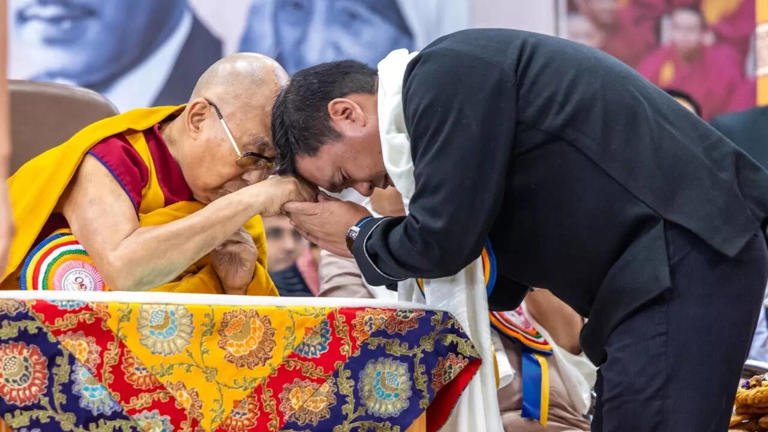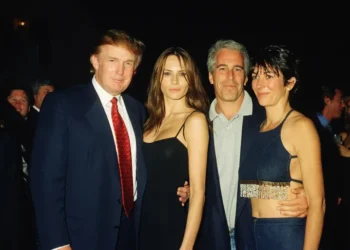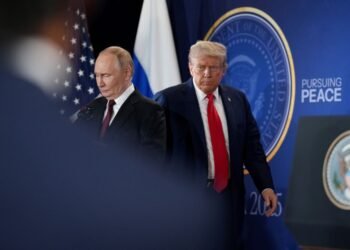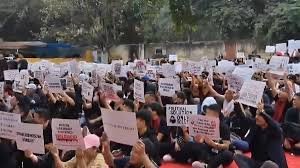By Navin Upadhyay
In an age of diplomatic tightropes and strategic ambiguity, Arunachal Pradesh Chief Minister Pema Khandu has emerged as perhaps India’s strongest and most vocal leader in publicly standing up to China. His recent declaration that “the next Dalai Lama will be born in a free and democratic country — and that rules out China” wasn’t just a regional sentiment. It was a defiant, spiritual, and political message that cut through the fog of New Delhi’s often cautious China policy.
When the Indian government, under apparent pressure from Beijing, hesitated to endorse the Dalai Lama’s position on the succession of the 15th spiritual leader, it was Khandu — not a Union Minister or a foreign policy mandarin — who made India’s most direct statement. With quiet but firm resolve, he asserted that the Dalai Lama’s reincarnation would not happen in a country “that lacks democracy” — a thinly veiled rejection of China’s repeated claims that it alone will choose the next Dalai Lama.
For those unfamiliar with the Himalayan state’s deep spiritual and cultural roots, Khandu’s statement might seem bold, even controversial. But for the people of Tawang, Bomdila, and the Monpa and Sherdukpen communities of Arunachal Pradesh, it was a reaffirmation of an ancient, unbroken bond with the Dalai Lama and his teachings.
A Legacy Rooted in Faith and Resistance
Arunachal Pradesh shares not only a 1,000-km contested border with China — along the Line of Actual Control (LAC) — but also an intimate spiritual link with Tibet. The state is home to the Tawang Monastery, the largest in India and second only to Lhasa. More than a religious site, it is a living symbol of the region’s connection to Tibetan Buddhism.
“There is no point in speculating where next Dalai Lama will be born.
He will be born in India or Tibet.
His Holiness also said in an interview that next Dalai Lama will be born in a free country.”
– Arunachal CM Pema Khandu pic.twitter.com/ZsOzU1h0YN
— News Arena India (@NewsArenaIndia) July 9, 2025
Notably, Tsangyang Gyatso, the Sixth Dalai Lama, was born in Tawang in 1683 — a historical truth China attempts to twist into a territorial claim over Arunachal. Beijing insists the state is part of “South Tibet,” a claim India flatly rejects. But it is through spiritual continuity, not cartographic assertion, that Arunachal’s people claim their identity — and leaders like Pema Khandu have become standard-bearers of that resistance.
The Dalai Lama’s India, and Arunachal’s Devotion
Since his escape from Tibet in 1959, the 14th Dalai Lama has visited Arunachal Pradesh several times, most recently in 2017, drawing tens of thousands of pilgrims despite Chinese protests. Khandu, a devout Buddhist from Tawang, played a central role in that visit.
For Khandu and his people, the Dalai Lama is more than a spiritual leader — he is a symbol of cultural belonging and moral courage. That makes Beijing’s insistence on anointing the next Dalai Lama not just offensive, but deeply personal.
When New Delhi chose strategic silence on the Dalai Lama’s succession, it was Khandu who spoke for the faithful:
“The institution of the Dalai Lama belongs to the faithful, not to a state. It will continue under spiritual tradition, not political diktats,” he said in an interview — a statement grounded as much in diplomacy as in belief.
The Dam That Could Become a “Water Bomb”
In a recent interview with PTI, Khandu issued another chilling warning: that China’s mega-dam project on the Yarlung Tsangpo river (the Brahmaputra in India) is an existential threat that may surpass even military concerns.
“Setting aside the military threat from China, it seems to me that this is a far bigger issue than anything else. It is going to cause an existential threat to our tribes and our livelihoods,” Khandu warned. “It is quite serious because China could even use this as a sort of ‘water bomb’.”
READ: Kapil Sharma’s Café in Canada Shot at, Khalistani Terrorist Owns Up
He was referring to China’s $137 billion hydropower project, slated to produce 60,000 MW, making it the world’s largest dam. The project, greenlit in 2024, is near Metog County, not far from the Arunachal border. Khandu expressed concern that since China is not a signatory to any international water-sharing treaty, there are no binding norms requiring it to release downstream water for ecological balance or Indian consumption.
“The issue is that China cannot be trusted. No one knows what they might do,” Khandu said. “Had China signed the international water treaty, this wouldn’t be a problem. But without that accountability, they could shut or release water at will — and that’s a threat no military can predict or deter.”
His words echoed fears long voiced by strategic experts: that China’s control over transboundary rivers could be used to assert dominance over downstream nations, particularly India and Bangladesh.
A Rare Political Stand
While New Delhi walks a cautious diplomatic line — balancing deterrence and dialogue — Khandu has no such luxury. His state is the front line of Chinese expansionism. His people are the first to face map alterations, border transgressions, and spiritual distortions.
Yet his resistance is neither loud nor theatrical. It is quiet, unwavering, and rooted in both lived reality and ancestral truth. In a political landscape often clouded by rhetoric, his words cut deeper — because they are lived.
Arunachal: More Than a Border
Beijing’s attempts to subsume Arunachal under its narrative are not merely geopolitical. They are an assault on faith, history, and identity. The Dalai Lama’s succession issue and the hydrological threat of the Yarlung Tsangpo dam are both weapons in a war of erasure.
READ: National Tennis Player Radhika Yadav Shot Dead by Father in Gurugram
Khandu has chosen to resist — not with rage, but with rootedness. Under his leadership, Arunachal Pradesh has become a last bastion of spiritual sovereignty, not just geographic defense.
A Voice That Matters
In an era where global diplomacy is often conducted through careful silences and tactical ambiguity, Pema Khandu’s clarity is refreshing and necessary. He doesn’t posture for the cameras in Delhi or tweet for international applause. But from the snow-fed rivers of Siang to the monastery steps of Tawang, his words carry weight.
His voice — warning of a “water bomb” at the border, insisting that the next Dalai Lama will be chosen by the faithful, not by a communist regime — is perhaps India’s most authentic frontline defense.
“The next Dalai Lama will be born in a free world,” Khandu says.
“And that world is not China.”













